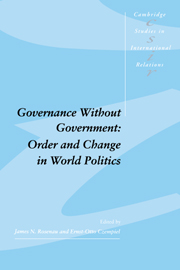Book contents
- Frontmatter
- Contents
- Notes on contributors
- Preface
- 1 Governance, order, and change in world politics
- 2 Governance without government: polyarchy in nineteenth-century European international politics
- 3 The decaying pillars of the Westphalian temple: implications for international order and governance
- 4 The “triumph” of neoclassical economics in the developing world: policy convergence and bases of governance in the international economic order
- 5 Towards a post-hegemonic conceptualization of v/orld order: reflections on the relevancy of Ibn Khaldun
- 6 The effectiveness of international institutions: hard cases and critical variables
- 7 Explaining the regulation of transnational practices: a state-building approach
- 8 “And still it moves!” State interests and social forces in the European Community
- 9 Governance and democratization
- 10 Citizenship in a changing global order
- Index
7 - Explaining the regulation of transnational practices: a state-building approach
Published online by Cambridge University Press: 13 October 2009
- Frontmatter
- Contents
- Notes on contributors
- Preface
- 1 Governance, order, and change in world politics
- 2 Governance without government: polyarchy in nineteenth-century European international politics
- 3 The decaying pillars of the Westphalian temple: implications for international order and governance
- 4 The “triumph” of neoclassical economics in the developing world: policy convergence and bases of governance in the international economic order
- 5 Towards a post-hegemonic conceptualization of v/orld order: reflections on the relevancy of Ibn Khaldun
- 6 The effectiveness of international institutions: hard cases and critical variables
- 7 Explaining the regulation of transnational practices: a state-building approach
- 8 “And still it moves!” State interests and social forces in the European Community
- 9 Governance and democratization
- 10 Citizenship in a changing global order
- Index
Summary
With the decline of the Cold War, the search for new or continuing threats to the West is already well underway. Among the major candidates are international terrorism, the international drug trade, and the turbulent, unstable Third World in general. All of these threats, it is important to emphasize, come principally from the South. So by some accounts, the focus of security concerns will shift from the East–West to the North–South axis.
Interestingly, several centuries ago the situation was largely the reverse, with the Europeans bringing comparable threats to the non-European world. European pirates, privateers, mercantile companies, conquistadores, and adventurers of various sorts used violence against civilians and governments outside Europe in the pursuit of their own interests and the interests of their home states. Their actions had devastating consequences for areas beyond the European state system.
The carnage and destruction wrought by the mercantile companies in Asia and by the conquistadores in Latin America are well known. Sir Francis Drake extorted large ransoms from two Spanish colonial cities by threatening to burn them to the ground. He actually destroyed three other cities. Individuals in the nineteenth-century United States launched numerous international military expeditions to acquire new territory for the United States, liberate Latin American territories from Spanish rule, or acquire their own “kingdoms.” Undoubtedly, the most famous of these was William Walker who invaded Nicaragua, declared himself president and ruled the country for eighteen months.
- Type
- Chapter
- Information
- Governance without GovernmentOrder and Change in World Politics, pp. 195 - 218Publisher: Cambridge University PressPrint publication year: 1992
- 6
- Cited by

